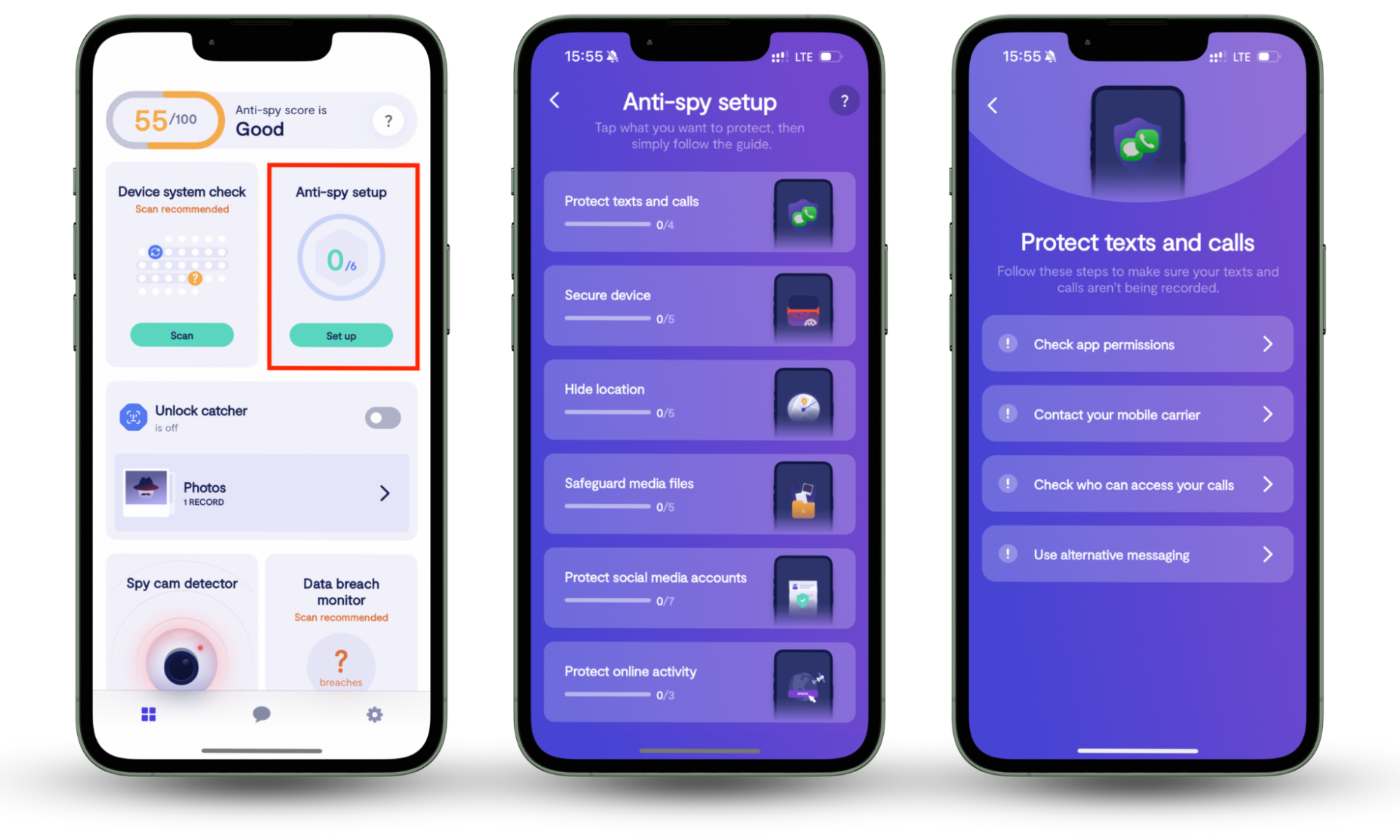Table of contents
- Why the government may spy on you
- 6 ways the government can spy on you
- How to protect yourself from government spying
- 1. Use end-to-end encrypted messaging apps
- 2. Use a reputable virtual private network (VPN)
- 3. Secure your browsing with privacy tools
- 4. Avoid using smart devices unnecessarily
- 5. Lock down your mobile and computer settings
- 6. Limit social media exposure
- 7. Be cautious about cloud storage and email
- 8. Encrypt your files and communications
- 9. Know your rights regarding surveillance
- Conclusion
Why the government may spy on you
Governments track people for several reasons, and you don't need to be a criminal to end up on their radar. Governments might spy on you for:
- National security: Identifying potential threats to the country.
- Law enforcement: Investigating crimes and gathering evidence.
- Terrorism prevention: Monitoring suspicious activities and communications.
- Political activism monitoring: Tracking protesters, activists, and dissidents.
The government is watching you through two main surveillance approaches. Bulk data collection means they gather everyone's information first, then analyze it later. Targeted surveillance focuses on specific individuals they're already investigating. Either way, they collect your personal data.
You might think you have nothing to hide, but governments define “suspicious activity” quite broadly. Visiting certain websites, attending protests, or communicating with monitored individuals can trigger surveillance. Here’s how to know if the government is watching you via your computer.
6 ways the government can spy on you
Governments have many ways to monitor their citizens, and most of them work without your knowledge. The most common surveillance techniques include:
- Cell tower tracking: Your phone constantly sends signals to nearby cell towers. Governments access this data to track your location throughout the day, building a map of where you go and when.
- Facial recognition systems: Cities install thousands of CCTV cameras that create a web of surveillance across urban areas. Law enforcement uses these to track suspects, and AI facial recognition identifies specific people from a crowd.
- Commercial data brokers: Private companies collect your personal information online, then sell this data to government agencies. This includes your shopping habits, location history, social connections, and personal preferences.
- Metadata collection: Intelligence agencies record details about your communications without accessing the actual content. This creates a detailed picture of your social network and daily routines without technically “listening in.”
- Internet monitoring: Agencies can access your browsing history, social media posts, searches, and messages through various websites. They monitor for specific keywords, track website visits, and analyze your digital behavior patterns.
- Financial surveillance: Banks and payment processors share transaction data with government agencies, showing them your spending patterns and income sources.
Programs like the NSA's PRISM and Five Eyes intelligence sharing demonstrate how extensively governments collect personal data. Even if they don’t target you directly, your information likely exists in government databases because of these mass collection efforts.
If you’re worried about those programs, here’s how to stop the NSA from spying on you.
Next, we’ll dive into how you can stop the government from watching you. But the simplest way to secure your phone from Android or iPhone government spying is by using Clario Anti Spy’s Anti-spy setup. Here’s how to use it:
- Download Clario Anti Spy and create an account.
- On the home screen, look for Anti-spy setup. Press Set up when you find it.
- You’ll now see a list of actions you can take to make your device less vulnerable. Go through each action step-by-step until you’ve completed the process and secured your phone.

How to protect yourself from government spying
To reduce your digital footprint and make surveillance much harder, use encrypted messaging and VPN services to hide your communications and location. Secure your devices, limit social media exposure, protect your cloud storage, and understand your legal rights.
Here’s how to take these practical steps and stop the government from spying on you:
1. Use end-to-end encrypted messaging apps
End-to-end encryption scrambles your messages so only you and the recipient can read them. If someone intercepts your communications, they’ll see meaningless code instead of your actual conversations. Apps like Signal offer this protection by default.
2. Use a reputable virtual private network (VPN)
A VPN creates a secure tunnel between your device and the internet, hiding your real IP address and location. When you use a VPN, others can only see the VPN’s location instead of yours. This makes it much harder to track your online activities back to you.
VPNs are especially useful on public Wi-Fi networks, which can be dangerous because of hackers. Avoid free VPNs because they often record your data and sell it to make money, defeating the purpose of privacy protection.
3. Secure your browsing with privacy tools
Privacy-focused browsers like Firefox or Brave block a ton of tracking software by default. They prevent websites from collecting your browsing patterns and stop third-party cookies that follow you across the internet.
Adding extensions like uBlock Origin and Privacy Badger provides extra protection against surveillance. A reputable antivirus is also a good idea—just in case your secure browsing tools fail and you find yourself needing to remove malware.
4. Avoid using smart devices unnecessarily
Smart TVs, voice assistants like Alexa, and Internet of Things (IoT) devices constantly collect data about your habits and conversations. These devices often have always-on microphones that can record private discussions, even when you think they're not listening.
To avoid tracking, limit smart device usage to essential functions only. Turn off always-on listening features, use manual activation instead of voice commands, and avoid placing smart speakers in private areas like bedrooms.
5. Lock down your mobile and computer settings
Your devices constantly share personal information, especially through trackers that developers embed in their apps. The developers sell this data to third-party data brokers, who in turn may sell it to the government.
Most apps request far more data than necessary. It’s crucial to review your privacy settings and disable unnecessary permissions where possible. Turn off any “features” that share or sell your information, like advertising IDs on Android.
6. Limit social media exposure
Everything you post on social media creates a detailed profile that governments can analyze. That’s why it’s important to avoid sharing your location, political opinions, or daily routines that they (or anyone else) could use to track your behavior.
You could even consider using fake names or reducing your social media presence entirely. The less personal information about you online, the harder it is for anyone to build a comprehensive profile about your life.
7. Be cautious about cloud storage and email
Cloud storage providers like Google Drive, iCloud, and Dropbox can be legally forced to hand over your files to government agencies. Standard email services also cooperate with surveillance requests and often scan message content.
To prevent this, use encrypted cloud services like ProtonDrive that can't decrypt your files even when requested. For existing cloud storage, encrypt sensitive files before uploading them using tools like 7-Zip.
8. Encrypt your files and communications
File encryption turns your documents into unreadable jargon that you need a password to access. This protection keeps your data safe even if someone gets a hold of your devices or cloud accounts.
Both Windows and macOS include built-in encryption tools that can keep your files safe. Use strong, unique passwords for encrypted files and store them separately from the encrypted data.
9. Know your rights regarding surveillance
Understanding your legal rights helps you respond when facing a government investigation. Different countries have different laws about what governments can access, how long they store your data, and what you must give them if they question you.
Research your local privacy laws so you know when you can legally refuse requests for personal information. If you’re involved in activism or work that might attract government attention (like journalism), consider asking a lawyer for advice.
Conclusion
Governments collect your personal data every day. While this surveillance is extensive, you’re not powerless against it. Simple changes like using encrypted messaging and securing your device settings can seriously reduce your digital footprint.
If you want to streamline those protections, Clario Anti Spy’s Anti-spy setup will guide you through the technical process. Download Clario Anti Spy today and secure your device from unwanted trackers.


